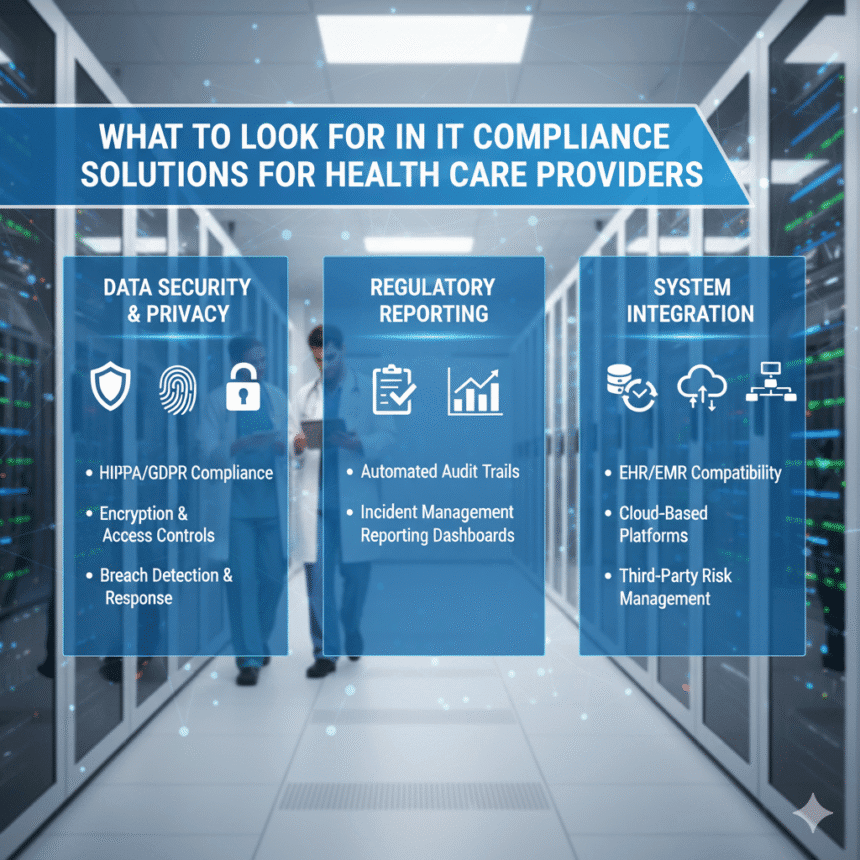The compliance requirements for health care providers can be complex — after all, you are dealing with people’s lives and health. IT solutions help simplify this process, allowing you to keep abreast of industry standards and best practices, even amid changing obligations.
- Top Features to Look for in IT Compliance Solutions
- Comprehensive Regulatory Coverage
- Policy Management
- Risk Assessment and Monitoring
- Robust Data Encryption and Access Controls
- Audit Trails and Reporting Capabilities
- Automated Alerts and Notifications
- Employee Training
- 5 Best IT Compliance Solutions for Health Care Providers
- The Benefits of Health Care Compliance
- Choosing the Right Health Care Compliance Software
Top Features to Look for in IT Compliance Solutions
When evaluating IT compliance solutions for health care providers, it’s best to focus on tools that simplify workflows while maintaining robust technical safeguards. Consider these features when looking for a platform:
Comprehensive Regulatory Coverage
Health care providers must comply with a wide range of regulations. The Health Insurance Portability and Accountability Act (HIPAA) is the most common, but depending on your services and location, other frameworks may apply, such as:
- Health Information Technology for Economic and Clinical Health (HITECH)
- Payment Card Industry Data Security Standard (PCI DSS)
- General Data Protection Regulation (GDPR)
- Personal Information Protection and Electronic Documents Act (PIPEDA)
An effective IT compliance solution should cover all relevant regulations and provide updates when laws change, ensuring your organization stays compliant when new requirements take effect.
Policy Management
Policies form the foundation of compliance. A strong platform should make it easy to create, update and distribute policies across your company. Features like automated version control and access tracking promote transparency and accountability across the team, minimize confusion and maintain consistent practices.
Risk Assessment and Monitoring
Health care compliance requires ongoing risk assessments. Solutions should provide tools that identify vulnerabilities and assess their impact. Furthermore, they should offer security recommendations to minimize risk. Continuous monitoring detects risks in real time, allowing you to respond quickly before minor issues escalate into major violations.
Robust Data Encryption and Access Controls
Protecting patient information is a core requirement under many compliance frameworks. Built-in encryption protocols help protect sensitive personal and company data during transmission and storage. Granular access controls ensure only authorized staff can view and edit records, preventing breaches and errors.
Audit Trails and Reporting Capabilities
Internal and external audits are an expectation in health care, ensuring compliance with established standards. Platforms with comprehensive trails capture every opening, modification or transfer of data, creating a transparent record of activity. Reporting tools help you generate reports quickly, minimizing the manual effort required to produce documentation.
Automated Alerts and Notifications
Health care staff are busy, making it easy to overlook compliance updates and deadlines. Automated alerts ensure nobody misses anything, and staff can perform policy reviews, risk assessments and other essential tasks on time. These alerts also send real-time warnings of suspicious activity, allowing for quick response times.
Employee Training
Human error is one factor contributing to compliance and data breaches. In 2024, 95% of infiltrations occurred due to human error. Effective IT compliance solutions often include built-in training modules. These resources educate staff about compliance policies and best practices, helping their work performance and adherence to industry standards.
5 Best IT Compliance Solutions for Health Care Providers
Selecting a solution among dozens of possibilities can be challenging. The best compliance software companies streamline your health care organization’s regulatory compliance efforts.
1. Compass IT Compliance
Compass IT Compliance tops this list with its comprehensive approach to health care adherence. It helps providers follow industry standards and best practices, including HIPAA, HITECH and PCI DSS.
Its team of IT and compliance experts further strengthens your compliance and data security efforts through vulnerability assessments, penetration testing and vendor management, among other services.
Key features:
- Comprehensive coverage for multiple regulatory systems, including HIPAA, HITECH and PCI DSS
- Penetration testing and vulnerability assessments for improved cybersecurity systems
- Business continuity planning for seamless integration
2. MedStack
MedStack focuses on compliance specific to the health care industry, accounting for standards like HIPAA, PIPEDA and GDPR. It streamlines health care adherence with prebuilt controls and privacy policies.
While comprehensive, its solutions especially accommodate digital health care providers, enabling them to conduct telehealth sessions and facilitate long-distance digital transactions securely.
Key features:
- Strong security controls following established health care compliance frameworks
- User-friendly training and templates for easier compliance
- Automated document generation and certifications for simpler audit preparation
3. VComply
VComply is a cloud-based governance, risk and compliance (GRC) platform that can help you streamline operations. Its functions can follow standard health care frameworks like HIPAA and GDPR, keeping teams and processes audit-ready.
This tool centralizes all compliance-related documents and records, keeping them accessible and alerting you to potential issues before they escalate. It’s also user-friendly, allowing health care teams to set up their systems easily and with little need for high-tech assistance.
Key features:
- Comprehensive framework support, including HIPAA, GDPR and ISO 9001
- Customizable and informative dashboards
- No-code setup that easily integrates with existing workflows
4. MedTrainer
MedTrainer specializes in health care compliance and staff training. Its comprehensive software helps teams follow industry frameworks and equips employees with the necessary certifications to do their jobs well.
It simplifies documentation, offers automated policy updates and helps staff complete training requirements on schedule, ensuring the organization stays compliant and audit-ready.
Key features:
- Well-equipped learning management system to improve staff expertise
- AI-powered compliance features for automated updates and suggestions
- Comprehensive reports and dashboards for real-time, informative updates
5. ComplyAssistant
ComplyAssistant is a GRC platform designed for health care organizations. It provides tools for efficient and proactive risk and compliance management. The company acknowledges the complexity of GRC processes in the industry and aims to simplify them to improve workplace efficiency.
It follows many established compliance frameworks and offers improved cybersecurity and documentation to adhere to these standards, protecting health care providers and their patients.
Key features:
- Internal and external risk assessments for improved security and HIPAA compliance
- Real-time updates and data insights for agile responses
- Scalable and able to support businesses of all sizes
The Benefits of Health Care Compliance
Investing in an IT compliance solution offers numerous operational and reputational benefits.
Reduced Legal Risk
Compliance software helps health care providers align with industry and legal regulations, reducing the chance of violations. Avoiding fines, penalties, and legal disputes saves time and money while protecting your organization’s reputation.
Cost Savings
Manual compliance management can be resource-intensive, especially when adhering to multiple standards simultaneously. Automated tools save time, reduce staff workload, minimize errors and lower the costs associated with regulatory audits or data breaches. While an IT solution can be a significant investment, the savings will outweigh the initial cost in the long term.
Centralized Documents
A compliance solution provides a single, organized repository of essential documents, like policies, training records and audit reports. This centralization makes it easier for staff to locate important files while improving efficiency and reducing redundancies.
Patient and Stakeholder Trust
Patients, vendors and other stakeholders expect you to protect their personal information. Demonstrating that you take compliance seriously reassures patients of their data’s safety. It also shows regulators, vendors, and business partners your professionalism and reliability.
Choosing the Right Health Care Compliance Software
While several well-designed health care compliance solutions are available, there is rarely a one-size-fits-all option. Selecting the right one requires a thoughtful evaluation of organizational needs and priorities.
Compliance Needs
Choose software that aligns with your specific requirements. Products can cater to different regulatory frameworks, like HIPAA, GDPR or PCI DSS. For example, U.S. providers will need HIPAA coverage, while those in the EU will require GDPR compliance.
Budget Considerations
Compliance software can vary widely in price. Health care providers should balance their budget with the level of protection and features they need. An effective solution will significantly reduce risks and improve adherence while fitting within financial constraints.
Integration
Health care providers often use different systems, like billing software and communication tools. Compliance software should integrate seamlessly with existing operations to avoid workflow disruptions.
User-Friendliness
A powerful compliance tool can only be effective if staff find it easy to use. Look for platforms with intuitive dashboards, simple navigation and clear instructions. Simplicity improves adoption and maintains employee engagement.
Scalability
As your organization grows, so will your compliance needs. A scalable solution can seamlessly handle changing patient volumes, additional staff or new services, ensuring operational continuity.
Responsiveness and Support
Compliance or software issues can arise at any time. Solution providers should be responsive in offering customer support, helping health care providers resolve problems quickly and minimizing interruptions in their operations.
Strengthening Compliance and Security
Health care compliance can be complex, but the right IT solution can simplify and streamline the process. Aside from checking boxes, finding the right software partner allows you to protect your patients, reassure stakeholders and maintain high standards of work that fulfill your mission to provide quality care.








